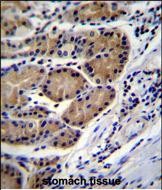CTSO Antibody (N-term)
Affinity Purified Rabbit Polyclonal Antibody (Pab)
- SPECIFICATION
- CITATIONS
- PROTOCOLS
- BACKGROUND

Application
| IHC-P, WB, E |
|---|---|
| Primary Accession | P43234 |
| Other Accession | NP_001325.1 |
| Reactivity | Human |
| Host | Rabbit |
| Clonality | Polyclonal |
| Isotype | Rabbit IgG |
| Calculated MW | 35958 Da |
| Antigen Region | 69-98 aa |
| Gene ID | 1519 |
|---|---|
| Other Names | Cathepsin O, CTSO, CTSO1 |
| Target/Specificity | This CTSO antibody is generated from rabbits immunized with a KLH conjugated synthetic peptide between 69-98 amino acids from the N-terminal region of human CTSO. |
| Dilution | IHC-P~~1:10~50 WB~~1:1000 E~~Use at an assay dependent concentration. |
| Format | Purified polyclonal antibody supplied in PBS with 0.09% (W/V) sodium azide. This antibody is purified through a protein A column, followed by peptide affinity purification. |
| Storage | Maintain refrigerated at 2-8°C for up to 2 weeks. For long term storage store at -20°C in small aliquots to prevent freeze-thaw cycles. |
| Precautions | CTSO Antibody (N-term) is for research use only and not for use in diagnostic or therapeutic procedures. |
| Name | CTSO |
|---|---|
| Synonyms | CTSO1 |
| Function | Proteolytic enzyme possibly involved in normal cellular protein degradation and turnover. |
| Cellular Location | Lysosome. |
| Tissue Location | Expressed in all tissues examined. High levels seen in the ovary, kidney and placenta while low levels seen in thymus and skeletal muscle |

Thousands of laboratories across the world have published research that depended on the performance of antibodies from Abcepta to advance their research. Check out links to articles that cite our products in major peer-reviewed journals, organized by research category.
info@abcepta.com, and receive a free "I Love Antibodies" mug.
Provided below are standard protocols that you may find useful for product applications.
Background
The protein encoded by the gene is a cysteine proteinase and a member of the papain superfamily. This proteolytic enzyme is involved in cellular protein degradation and turnover. The recombinant form of this enzyme was shown to degrade synthetic peptides typically used as substrates for cysteine proteinases and its proteolytic activity was abolished by an inhibitor of cyteine proteinase.
References
Roeske, D., et al. Mol. Psychiatry (2009) In press :
Lamesch, P., et al. Genomics 89(3):307-315(2007)
Santamaria, I., et al. Genomics 53(2):231-234(1998)
Shi, G.P., et al. FEBS Lett. 357(2):129-134(1995)
Velasco, G., et al. J. Biol. Chem. 269(43):27136-27142(1994)
If you have used an Abcepta product and would like to share how it has performed, please click on the "Submit Review" button and provide the requested information. Our staff will examine and post your review and contact you if needed.
If you have any additional inquiries please email technical services at tech@abcepta.com.













 Foundational characteristics of cancer include proliferation, angiogenesis, migration, evasion of apoptosis, and cellular immortality. Find key markers for these cellular processes and antibodies to detect them.
Foundational characteristics of cancer include proliferation, angiogenesis, migration, evasion of apoptosis, and cellular immortality. Find key markers for these cellular processes and antibodies to detect them. The SUMOplot™ Analysis Program predicts and scores sumoylation sites in your protein. SUMOylation is a post-translational modification involved in various cellular processes, such as nuclear-cytosolic transport, transcriptional regulation, apoptosis, protein stability, response to stress, and progression through the cell cycle.
The SUMOplot™ Analysis Program predicts and scores sumoylation sites in your protein. SUMOylation is a post-translational modification involved in various cellular processes, such as nuclear-cytosolic transport, transcriptional regulation, apoptosis, protein stability, response to stress, and progression through the cell cycle. The Autophagy Receptor Motif Plotter predicts and scores autophagy receptor binding sites in your protein. Identifying proteins connected to this pathway is critical to understanding the role of autophagy in physiological as well as pathological processes such as development, differentiation, neurodegenerative diseases, stress, infection, and cancer.
The Autophagy Receptor Motif Plotter predicts and scores autophagy receptor binding sites in your protein. Identifying proteins connected to this pathway is critical to understanding the role of autophagy in physiological as well as pathological processes such as development, differentiation, neurodegenerative diseases, stress, infection, and cancer.



